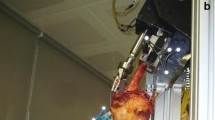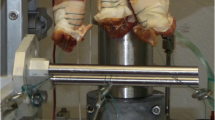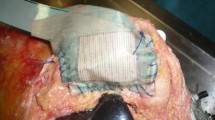Abstract
The purpose of this study was to investigate the influence of lateral retinacular release and medial and lateral retinacular deficiency on patellofemoral position and retropatellar contact pressure. Human knee specimens (n = 8, mean age = 65 SD 7 years, all male) were tested in a kinematic knee-simulating machine. During simulation of an isokinetic knee extension cycle from 120° to full extension, a hydraulic cylinder applied sufficient force to the quadriceps tendon to produce an extension moment of 31 Nm. The position of the patella was measured using an ultrasound based motion analysis system (CMS 100®, Zebris). The amount of patellofemoral contact pressure and its pressure distribution was measured using a pressure sensitive film (Tekscan®, Boston). Patellar position and contact pressure were first investigated in intact knee conditions, after a lateral retinacular release and a release of the medial and lateral retinaculum. After lateral retinacular release the patella continuously moved from a significant medialised position at flexion (P = 0.01) to a lateralised position (P = 0.02) at full knee extension compared to intact conditions, the centre of patellofemoral contact pressure was significantly medialised (0.04) between 120° and 60° knee flexion. Patellofemoral contact pressure did not change significantly. In the deficient knee conditions the patella moved on a significant lateralised track (P = 0.04) through the entire extension cycle with a lateralised centre of patellofemoral pressure (P = 0.04) with a trend (P = 0.08) towards increased patellofemoral pressure. The results suggest that lateral retinacular release did not inevitably stabilise or medialise patellar tracking through the entire knee extension cycle, but could decrease pressure on the lateral patellar facet in knee flexion. Therefore lateral retinacular release should be considered carefully in cases of patellar instability.






Similar content being viewed by others
References
Bentley G, Dowd G (1984) Current concepts of etiology and treatment of chondromalacia patellae. Clin Orthop Relat Res 189:209–228
Christoforakis J, Bull AM, Strachan RK, Shymkiw R, Senavongse W, Amis AA (2006) Effects of lateral retinacular release on the lateral stability of the patella. Knee Surg Sports Traumatol Arthrosc 14(3):273–277
Dejour H, Walch G, Nove-Josserand L, Guier C (1994) Factors of patellar instability: an anatomic radiographic study. Knee Surg Sports Traumatol Arthrosc 2(1):19–26
Desio SM, Burks RT, Bachus KN (1998) Soft tissue restraints to lateral patellar translation in the human knee. Am J Sports Med 26(1):59–65
Draganich LF, Andriacchi TP, Andersson GB (1987) Interaction between intrinsic knee mechanics and the knee extensor mechanism. J Orthop Res 5(4):539–547
Durselen L, Claes L, Kiefer H (1995) The influence of muscle forces and external loads on cruciate ligament strain. Am J Sports Med 23(1):129–136
Eckhoff DG, Bach JM, Spitzer VM, Reinig KD, Bagur MM, Baldini TH, Rubinstein D, Humphries S (2003) Three-dimensional morphology and kinematics of the distal part of the femur viewed in virtual reality. Part II. J Bone Joint Surg Am 85-A(Suppl):497–104
Eckhoff DG, Dwyer TF, Bach JM, Spitzer VM, Reinig KD (2001) Three-dimensional morphology of the distal part of the femur viewed in virtual reality. J Bone Joint Surg Am 83-A(Suppl 2 Pt 1):43–50
Elias JJ, Bratton DR, Weinstein DM, Cosgarea AJ (2006) Comparing two estimations of the quadriceps force distribution for use during patellofemoral simulation. J Biomech 39(5):865–872
Elias JJ, Cech JA, Weinstein DM, Cosgrea AJ (2004a) Reducing the lateral force acting on the patella does not consistently decrease patellofemoral pressures. Am J Sports Med 32(5):1202–1208
Elias JJ, Mattessich SM, Kumagai M, Mizuno Y, Cosgarea AJ, Chao EY (2004b) In vitro characterization of the relationship between the Q-angle and the lateral component of the quadriceps force. Proc Inst Mech Eng [H] 218(1):63–67
Farahmand F, Naghi TM, Amis A (2004) The contribution of the medial retinaculum and quadriceps muscles to patellar lateral stability—an in-vitro study. Knee 11(2):89–94
Fu FH, Maday MG (1992) Arthroscopic lateral release and the lateral patellar compression syndrome. Orthop Clin North Am 23(4):601–612
Guettler JH, Demetropoulos CK, Yang KH, Jurist KA (2005) Dynamic evaluation of contact pressure and the effects of graft harvest with subsequent lateral release at osteochondral donor sites in the knee. Arthroscopy 21(6):715–720
Harris ML, Morberg P, Bruce WJM, Walsh WR (1999) An improved method for measuring tibiofemoral contact areas in total knee arthroplasty: a comparison of K-scan sensor and Fuji film. J Biomech 32:951–958
Hawkins RJ, Bell RH, Anisette G (1986) Acute patellar dislocations. The natural history. Am J Sports Med 14(2):117–120
Henry JE, Pflum FA Jr (1995) Arthroscopic proximal patella realignment and stabilization. Arthroscopy 11(4):424–425
Hughston JC, Deese M (1988) Medial subluxation of the patella as a complication of lateral retinacular release. Am J Sports Med 16(4):383–388
Kolowich PA, Paulos LE, Rosenberg TD, Farnsworth S (1990) Lateral release of the patella: indications and contraindications. Am J Sports Med 18(4):359–365
Krompinger WJ, Fulkerson JP (1983) Lateral retinacular release for intractable lateral retinacular pain. Clin Orthop Relat Res 179:191–193
Kruger T, Gobel F, Huschenbett A, Hein W (2002) Significance of lateral release in the therapy of patellar chondromalacia. Zentralbl Chir 127(10):900–904
Larson RL, Cabaud HE, Slocum DB, James SL, Keenan T, Hutchinson T (1978) The patellar compression syndrome: surgical treatment by lateral retinacular release. Clin Orthop Relat Res 134:158–167
Malmstrom EM, Karlberg M, Melander A, Magnusson M (2003) Zebris versus Myrin: a comparative study between a three-dimensional ultrasound movement analysis and an inclinometer/compass method: intradevice reliability, concurrent validity, intertester comparison, intratester reliability, and intraindividual variability. Spine 28(21):E433–E440
Mau H (1980) Chondropathia patellae. Z Orthop Ihre Grenzgeb 118(2):208–218
Ostermeier S, Holst M, Bohnsack M, Hurschler C, Stukenborg-Colsman C, Wirth CJ (2006) Dynamic measurement of patellofemoral contact pressure following reconstruction of the medial patellofemoral ligament: an in-vitro study. Clin Biomech (Bristol, Avon). Cited 20 Nov 2006 [Epub ahead of print]
Ostermeier S, Hurschler C, Stukenborg-Colsman C, Wirth CJ (2006) In vitro investigation of the effect of medial patellofemoral ligament reconstruction and medial tibial tuberosity transfer on lateral patellar stability. Arthroscopy 22(3):308–319
Panni AS, Tartarone M, Patricola A, Paxton EW, Fithian DC (2005) Long-term results of lateral retinacular release. Arthroscopy 21(5):526–531
Popko J, Wasilewski A, Mnich Z, Nawara J (1983) Syndrome of excessive external stress of the patella (lateral hyperpression syndrome of the patella). Beitr Orthop Traumatol 30(11):571–575
Powers CM, Ward SR, Fredericson M, Guillet M, Shellock FG (2003) Patellofemoral kinematics during weight-bearing and non-weight-bearing knee extension in persons with lateral subluxation of the patella: a preliminary study. J Orthop Sports Phys Ther 33(11):677–685
Reilly DT, Martens M (1972) Experimental analysis of the quadriceps muscle force and patello-femoral joint reaction force for various activities. Acta Orthop Scand 43(2):126–137
Robinson M, Eckhoff DG, Reinig KD, Bagur MM, Bach JM (2006) Variability of landmark identification in total knee arthroplasty. Clin Orthop Relat Res 442:57–62
Sandmeier RH, Burks RT, Bachus KN, Billings A (2000) The effect of reconstruction of the medial patellofemoral ligament on patellar tracking. Am J Sports Med 28(3):345–349
Schultz W, Buhmann HW, Leib S (1996) Differential indications for so-called “lateral release” in treatment of chondropathia patellae. Sportverletz Sportschaden 10(1):13–18
Senavongse W, Farahmand F, Jones J, Andersen H, Bull AM, Amis AA (2003) Quantitative measurement of patellofemoral joint stability: force–displacement behavior of the human patella in vitro. J Orthop Res 21(5):780–786
Shellock FG, Mink JH, Deutsch A, Fox JM, Ferkel RD (1990) Evaluation of patients with persistent symptoms after lateral retinacular release by kinematic magnetic resonance imaging of the patellofemoral joint. Arthroscopy 6(3):226–234
Stukenborg-Colsman C, Ostermeier S, Hurschler C, Wirth CJ (2002) Tibiofemoral contact stress after total knee arthroplasty: comparison of fixed and mobile-bearing inlay designs. Acta Orthop Scand 73(6):638–646
Author information
Authors and Affiliations
Corresponding author
Rights and permissions
About this article
Cite this article
Ostermeier, S., Holst, M., Hurschler, C. et al. Dynamic measurement of patellofemoral kinematics and contact pressure after lateral retinacular release: an in vitro study. Knee Surg Sports Traumatol Arthrosc 15, 547–554 (2007). https://doi.org/10.1007/s00167-006-0261-0
Received:
Accepted:
Published:
Issue Date:
DOI: https://doi.org/10.1007/s00167-006-0261-0




